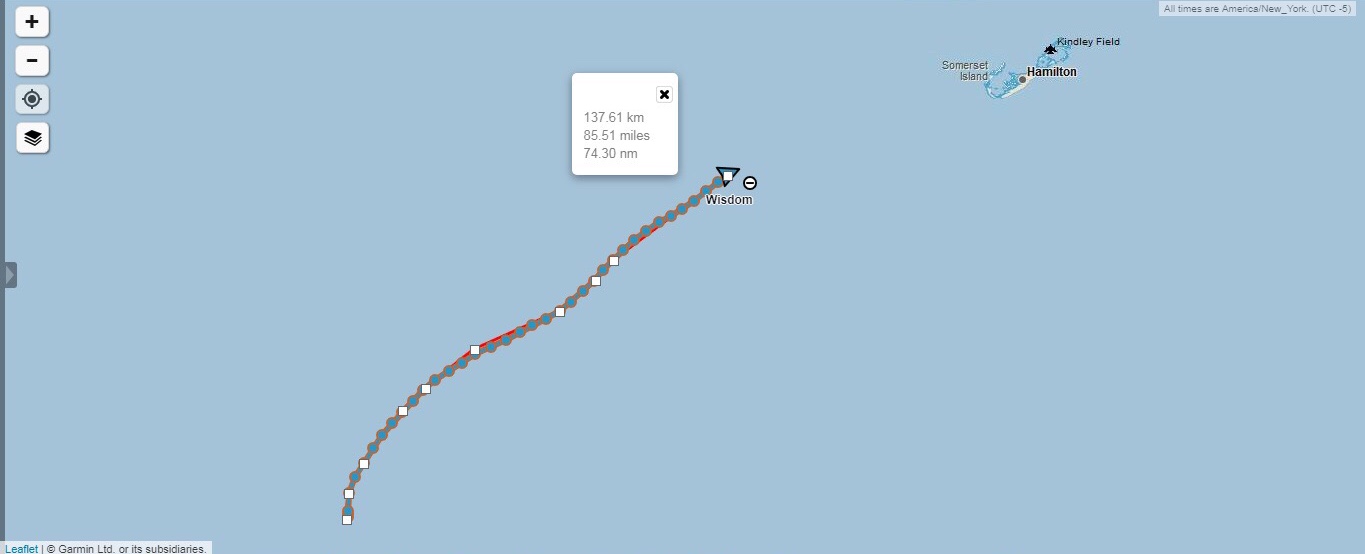Bermuda is not a wise port to enter in the dark. The waterways are littered with illuminated and non-illuminated markers. The reefs are so bad that there are cardinal markers all over the place! This is definitely a harbor to enter with the light of day, but we didn’t!
The island is surrounded by a vast reef which is littered with wrecks from centuries of sailors who lost their way and smashed into the punishing rocks and corals. We were not going to become another wreck that tourists snorkel over on a tour!
I began studying the charts of Bermuda way back in July 2017, when we were going to sail to there in October. I knew the different markers, the different channels, the different reefs. I knew it all and I knew it was bad and that I didn’t want to do it in the dark! That is precisely what I ended up doing.
As we approached the island, I stayed to the south to avoid the large reef that secretly lies to the west of the island. My rational was simple, if the winds died and we were drifting in to shore, the eastern side of the island has a more gradual rise of the sea floor than the western side. This would give us a better chance at anchoring and trying to wait for better winds.
Since dawn on July 4th, we had been in contact with the Bermuda Coast Guard. They knew we were close to their country, and they knew our intentions were to enter their harbor and anchor. If you are planning to sail to Bermuda, it would behoove you to email them ahead of time (dutyofficer@marops.bm). They will reply with an email that details all the information they request from you (this email will come from
messenger@marops.bm).
This makes the entire process so much easier, since over the radio they will go over every last detail you could ever imagine! If they already have your information, they are less suspicious of you and therefore the super lengthy questions are kept to a solid 15-30 minutes.
The Bermuda Coast Guard can be hailed by calling out for “Bermuda Radio” and they are truly the most helpful and courteous radio people we have ever encountered. Not only did they aid us in coming into their country, but they also offered suggestions for where to eat once we were settled and got most of the paper work started for us with the customs agent. When we finally did arrive, all we had to do was fill out a few forms, hand over our flare gun (it's technically a fire-arm), and pay $35 per person to get our cruising permit for the country.
We were sailing close to the island in strong winds during the morning, then the winds all seemed to vanish as another system was coming in. The next system was going to rage down on this little island for the next 4 days, so if we didn’t make it into the harbor today, we were going to be stuck hove to while we ride out a long duration gale. We did not want to do that.
We contacted Bermuda Radio and let them know that we were kind of stuck in the water without any wind and worried that we would be arriving at the entrance to the harbor (called Town Cut) in the dark. I knew this passage was very small, very tight, and with plenty of current and perils!
Bermuda Radio organized with a cruiser on a yacht that was already in the harbor to come out and meet us in the channel so that they could guide us into the harbor. We went from worrying about coming into the harbor in the dark to being guided by local knowledge as we slowly made our way into the island through the narrow pass.
We are often asked how we feel about the electric motor, and this is one of those moments when a diesel would have been nice. We would have cranked it on when the winds died and powered our way there in no time, come through the pass, and entered the harbor all on our own with no outside help. The truth is, the electric motor makes us more cautious sailors who plan everything and work with all the forces around us to safely navigate the ocean. If we had a diesel, we would have wanted to use it back in the doldrums, but that would have sucked up a lot of fuel! Would we have fuel in the tank at this point? If we are going to have a diesel motor, why go small, and only move at cruising speed, why not have a motor so inconceivably huge that it can power us at hull speed into wind and waves? Enough will never be enough and there will always be some drawback to any system in some situation. The secret is finding one that works well for you!
Yes, we love our electric motor just like someone loves their dog. You love it even when it poops in the kitchen! It is not perfect and, just like with a diesel motor, it has its drawbacks, but it is perfect for us.
We made it into the island and anchored safely in the harbor where the tall rocks of the island provided us wonderful protection from the winds that were soon to come.
We arrived in the harbor 1 day late. Our crew member began pondering if that was really so bad and if maybe he should carry on with us. Maddie and I quickly proclaimed that it would be best for him to fly back to Europe so that he doesn’t miss any scheduled deadlines he has imposed on himself. Besides, a day late is a day late, why start forgiving lateness now?
While we were in land now, we were not done yet, as we were tied to the customs pier. We were told that we could not stay tied to the pier because the pier needs to be open for other arriving yachts. We were the last boat to be checked in by the customs agents that night, and that it would be safest to move the boat at dawn when we could see better.
















